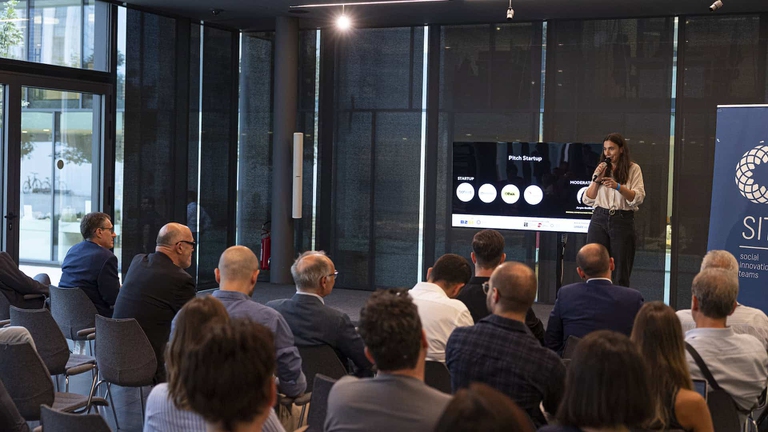https://www.lifegate.it/collaborazione-startup-grandi-aziende
- |
The September 4th Last year, Milan hosted the Business meets social innovation (B2SI), an event that focused on the link between business And social and environmental impact.Organized by the non-profit community Social innovation teams (Sit), the meeting involved not only startups and young talents, but also managers of large companies, investors and mentors, who shared their vision on the future of investments and on open innovation.Partner of the event was Social innovation monitor (Sim), an international research team based at the Polytechnic of Turin, which curated the panels and briefly presented its own plan of open sustainable innovation.

Startups, social innovation and open innovation:Is Italy ready?
One of the central themes that emerged during the event was the need to develop new investment metrics that can balance the financial return with thesocial and environmental impact.Today, in fact, companies - public and private - are increasingly protagonists in the promotion of sustainable and inclusive business models, positively influencing the economic and social fabric. The proposal, put forward by the Italian tech alliance and other stakeholders, focuses precisely on this:promote tools capable of reducing the risks associated with impact investments with the aim of supporting those companies that decide to support startups which, in addition to generating profits, are also capable of producing a positive effect for society and the environment.
An approach that moves in this direction is that ofopen innovation, a strategy in which companies do not limit themselves to developing innovation internally, but open themselves to collaboration with external actors such as startups, universities, research centers and suppliers.This model allows access to new resources and skills, with greater flexibility and speed of response to market changes.
Corporate venture capital as a driver for innovation
Among the most effective strategies to encourage this type of process is the so-called corporate venture capital (cvc), a form of investment increasingly used also by large companies in our country to invest in innovative startups and acquire a "window" on new technologies, without having to bear all the risks and costs of internal research.
According to i InnovUp and Assolombarda data, in 2023 almost a third of Italian startups and innovative SMEs saw corporate venture capital participation, generating 4.7 billion euros, The 45.6 percent of the total of revenues of these companies.Despite a 3.5 percent decrease in startups compared to 2022, the revenues of companies with corporate venture capital participation increased by 3.2 percent.

These data clearly indicate that corporate investments are significantly strengthening the startup ecosystem in Italy too.However, comparison with other European countries reveals an important disparity:while in Germany The 97 percent of listed companies has a corporate venture capital fund, in Italy only the 15 percent of companies have adopted this strategy.This gap underlines the need to introduce regulatory measures that further incentivize collaborations between large companies and startups, such as the French model which provides for the total tax amortization of corporate investments in startups over three years.
4 startups that are transforming the innovation ecosystem
One of the highlights of the event was the pitch session, during which four startups presented their innovative projects.Each of these realities offered a unique solution to respond to specific challenges, demonstrating how theinnovation it could be at the service of sustainability, well-being and intelligent resource management.
Goodness
Goodness it is a webapp that classifies and systematizes bonuses and public benefits, making them more accessible to citizens.By integrating these opportunities into your plans corporate welfare, the platform reduces overlaps between public and private services, optimizing the use of resources.In addition to supplementing workers' income, this service also makes the management of corporate benefits is more efficient and sustainable, maximizing its value and promoting more active employee involvement.
DoctorApp
DoctorApp simplifies access to basic medical services, because it allows users to book visits and medical consultations in just a few clicks, optimizing appointment management.With the increase in demand for digital health services, DoctorApp is entering a rapidly expanding market, contributing to make healthcare more accessible and efficient.
Orma guides
Sustainable tourism is at the heart of Orma guides, portal that offers transformative travel experiences led by influencers and experts in areas such as civil rights, environment and social innovation.These trips, tailor-made for young people passionate about sustainability, are designed to be immersive, allowing you to explore lesser-known places, enrich local communities and respect your surroundings.
SurgiQ
This startup uses advanced artificial intelligence algorithms to improve process management in health services, optimizing scheduling and workloads to reduce user wait times.With SurgiQ, digitalisation helps to improve the efficiency of healthcare facilities and guarantee a better experience for patients and for medical personnel.
The 2024 edition of Business meets social innovation highlighted how fundamental it is today join forces to accelerate positive change by creating a open and collaborative innovation ecosystem and focusing on business models capable of combining sustainability and profitability and encouraging a synergistic approach between innovation and social responsibility. The four startups presented are just some examples of how innovation can be put at the service of the common good, paving the way for a future more sustainable.

